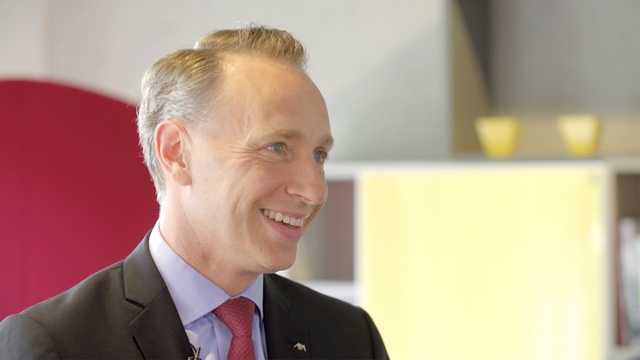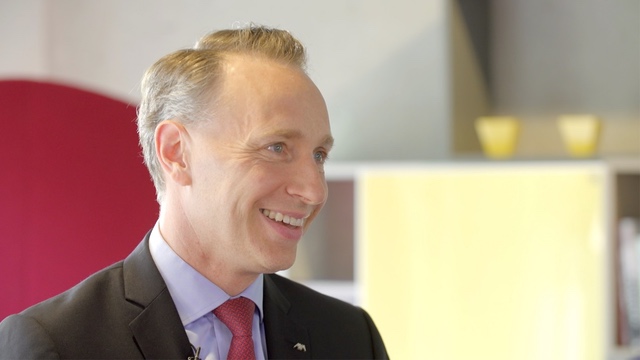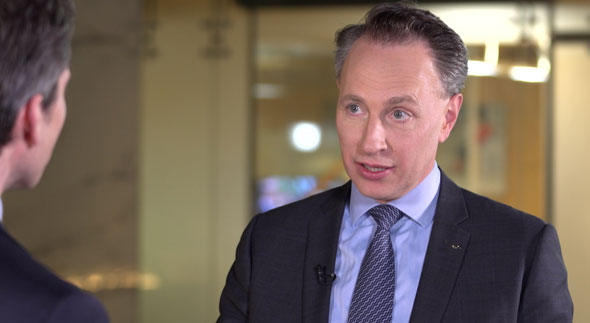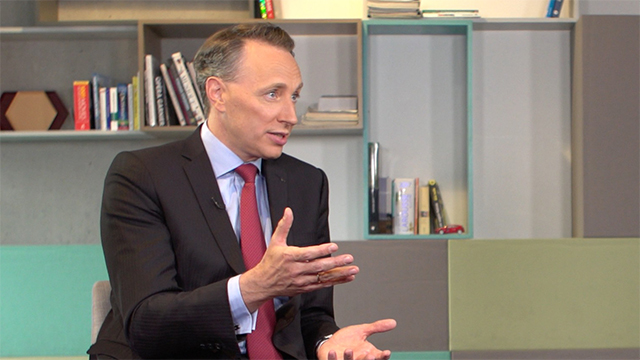EuroBusinessMedia (EBM): AXA, one of the world leaders in Insurance and Asset Management, reports earnings for the full year 2009. Henri de Castries, welcome. As the CEO of AXA, what are your comments on the group’s performance and results in 2009?
Henri de Castries (HDC): I think it’s pretty clear, 2009 is a year which is a contrasted year. It has ended better than it started, and for the group overall, it’s ending with strong and solid results. The illustration of that, is the following one: it has been a contrasted year, because the level of activity was not that good in the first half of the year, but we have seen a good momentum starting in the second half of the year, especially on the life side. So this leads to revenues which are slightly decreasing when compared to last year, but with a good momentum in the fourth quarter. It has been a contrasted year, because our earnings on the life side have rebounded very strongly whereas our earnings on the property and casualty side, due to climate events and to the impact of the recession, have declined. But it’s leading to very strong and solid results, because the net income is multiplied by four when compared to the previous year. The operating earnings are slightly declining. The balance sheet is much stronger, is reinforced, the solvency ratio is back to pre-crisis levels, the gearing is down. All this leads us to look at the future with confidence and to propose to the Shareholders’ Meeting an increase in the dividend, which is going to be an increase of approximately 40%. We had reduced significantly the dividend last year, we have the feeling this year that we can increase it significantly.
EBM: You recently lost market share in the US in Life Insurance. What’s your progress report today, on your efforts to re-conquer market share and to re-boost your business in the US?
HDC: First thing I would start with as far as the US are concerned, is the fact the operational profitability of our existing business is back. This was one of the key concerns of investors last year, whether our profitability in the US was structurally impaired. The operating earnings from this year in the US are showing that most of the issues have been fixed. That’s the good news. The price for that is, yes, we’ve lost market share, because we have re-priced our products earlier than most of the competitors, and therefore we are loosing some market share. But we think that re-pricing was essential, because what we want to do is sell products which are good for our customers, but with margins which are acceptable for our shareholders. So combining both in the short term is leading us to lose some market share. Are we worried for the long term? No, for two reasons. The first one is that the fundamentals of the market are good, the US households are starting to save more than before, and this is already visible in the numbers. The second point is that we have worked at enlarging and diversifying our product range, and the new products we are bringing to the market, I mean the Retirement Cornerstone is, we think, something which is extremely well adapted to the current US economic environment. You must remember that when two people in a household are getting to the age of 60, the probability of one of them living to 90 is 65%. So US households need on average approximately 30 years of savings. This is certainly going to make the products we are offering attractive for them in the future. So the short term losses are due to management actions we needed to take to preserve the long term competitiveness of the company. We are confident that the new products we are bringing to the market will help us regain market share going forward.
EBM: In Property and Casualty, what are your comments on the state of the cycle and price evolutions? Following the economic slowdown and the ensuing decrease in insurance capacity, what do you intend to favor today in the inevitable trade-off between profitability and growth?
HDC: The best way to answer your question, as far a Property and Casualty is concerned, is quite simple. Property and Casualty is a cyclical business, even if it is less cyclical than what it used to be. So what we have seen in 2009 is a phase of the cycle where the prices were decreasing, and where, on the claims side, we have seen the double impact of the recession on the one hand and climatic events on the other hand. So this has led to earnings which have decreased when compared to the previous year. We are confident when we look at the future. Why? First because the market is cyclical, and this means that there is a point where it is going to go up, and we think it’s already starting. We at AXA have already taken some significant pricing actions, which will help us improve the combined ratio going forward, and at the end of the day, we can do it because our product range, or our offer, is competitive and attractive. In 2009, despite this very difficult environment, we have attracted 1 million new clients. They would not have come to us had our products not been attractive. So it’s cyclical, the worst is probably already there, we see the future in a more positive way.
EBM: You’re currently trying to buy out your minority shareholders in Australia, before exiting the Australian market entirely. What’s your situation update today on this on-going saga.
HDC: It has been a saga, that’s clear! I mean the situation is pretty simple, and let’s be clear: the strategic rationale for us remains unchanged. What we want to have is a situation where we 100% own the Asian assets which are today co-owned with the Australian minority shareholders, and we want to sell our Australian operations to NAB or to AMP. One of the buyers has been agreed by the Australian board, the other has not. There is no final decision from the competition authorities at this stage. We think, we are very confident that there will be a positive outcome to this deal, and we think that we will reach what we want to reach, which is to be in full ownership of our Asian assets.
EBM: Even if we don’t yet know the new regulations to be brought about by Solvency 2, what are the implications for a group such as AXA?
HDC: It’s quite simple. First, at AXA, let me say very clearly that we think that Solvency 2 is a good system for the insurance industry as a whole. That of course the calibration of the risks has to be an adequate one. It’s a good system because it’s an economic measurement of the risk, the calibration is essential. As AXA, we are very, very conscious of the fact that the European Parliament has defined a framework, and we are looking for this framework to be applied, to be respected by the various regulators throughout Europe. A calibration that would not respect the guidelines which have been set by the European Parliament would not be good for the consumers, would not be good for the European economy, would not be good for the insurance shareholders, because it would be a misallocation of capital. This industry did not need additional capital in the crisis. We do not think that Solvency 2 should lead to an increased amount of capital for the industry. And we are sure that the European Commission has that in mind in the current discussions we are participating in.
EBM: Some analysts write that they are concerned about your debt level. AXA’s leverage would appear to be above historical averages for the group. Would you care to respond or make clarifications for the market on this topic?
HDC: Well I think the very simple answer to that is in the numbers. If you look at the solvency ratios, the solvency ratio is back to pre-crisis levels, above 170% in Solvency 1 measures. Also at a very, very high level in the Solvency 2 framework. The gearing has significantly decreased in 2009, and last but not least, there is something you should not forget, which is the ability to delivery a very significant level of operational earnings, underlying earnings, which are reinforcing the solvency, by approximately 20 basis points a year, which are then used to finance acquisitions, to pay the dividend, or to do other things. So the balance sheet of the group is strong. Its solvency is reinforced, so I don’t think people should be worried about that.
EBM: There’s a lot of speculation in the market about sovereign risk, especially in the so-called PIGS countries. Is it a matter of concern, with respect to your very large bond portfolios?
HDC: No, it’s not a concern. If you look at the total exposure of the group to the PIGS, or the total exposure to Greece, if you take the Greek example, the net exposure of the group is €600 million for a balance sheet which is a balance sheet of many hundreds of billions. So it’s extremely limited. We’ve always been very, very cautious in our asset allocation process, and if you want to have an illustration of that, look at the way the assets have gone through the crisis. Of course, some of them have declined in value with the markets. But AXA doesn’t belong to the list of groups which have been very unpleasantly surprised by the quality of their assets. The cautiousness of our investment processes, the cautiousness of our asset allocation is such that we do not fear what’s happening on the sovereign debts.
EBM: What is your outlook for this year, 2010?
HDC: We are confident about the future. Having said that, we have to remind the audience that the macro-economic environment remains pretty uncertain. It’s better than last year, but everything is not clarified. Having said that, we think we think that we should benefit on the Life and Savings side, and the Asset Management side, from the high savings rates in Europe, and from the increasing ones in the US, with a sort of gradual return to risk appetite from our clients. And on the Property and Casualty side, we want to benefit from the turnaround in the cycle. We want to keep the customer satisfaction at a high level, so we will have to work on our expenses, but overall, on the existing activities, it’s going to be increased level of savings and return of risk appetite on the Life and Savings and Asset Management side, and benefitting from the turnaround in the cycle on the P&C side. This is not the only thing we are going to do, because the group wants to continue to grow. We will grow by enlarging our product offer, especially in protection and health, we will also grow trying to penetrate new territories, especially in emerging countries, where we think that, in the future, growth and profitability will be strong. So it’s a combination of initiatives which overall should be fruitful.
EBM: Henri de Castries, CEO of AXA, thank you very much.
HDC: Thank you, and I would say thank you to the clients who have trusted us, thank you to the shareholders who have supported us in these difficult times, thank you, before all, to the teams who are on a daily basis are working hard to carry this ambition.





